Every day, people’s inboxes are bombarded with hundreds of messages. Senders compete for attention, interest and engagement. No one wants to lose engaged customers, so they fight tooth and nail to re-engage them and turn the ‘inactive’ subscribers into ‘active’ once again.
To maintain a healthy email list that grows instead of decreasing in number, marketers send what we call ‘we miss you emails’. If done right, these emails can boost the engagement and pull back your inactive subscribers.
But, they require tons of creativity to grab the attention and re-engage the reader. If you don’t know how to write them, a college paper writer can help you with it. In many ways, these messages are similar to the introduction to a college paper – it must be catchy and informational at the same time to keep the readers interested.
The right introduction to a paper or ‘miss you’ email can convince a lead you almost lost to remain interested in what you have to offer. To inspire your next campaign effort, here are 10 examples of highly effective re-engagement emails.
Contents
We Miss You Emails Examples You Must Consider
1. Animoto
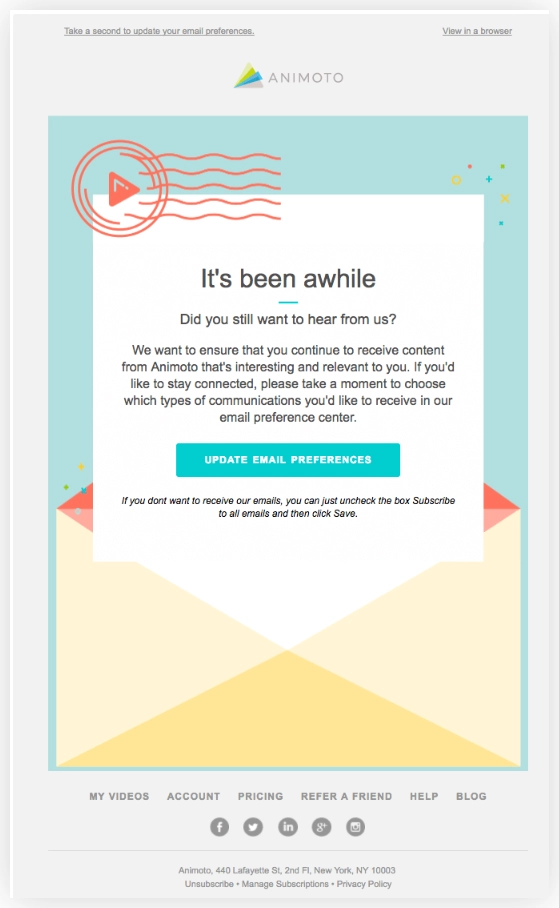
Sometimes, the best approach is the most direct approach. Animoto has a great example of such a re-engagement email. Their message simply asks the recipient if they still want to receive emails. It’s a great way to update your subscriber’s list and give people the choice to choose if they want to keep hearing from your business.
2. Lowe’s
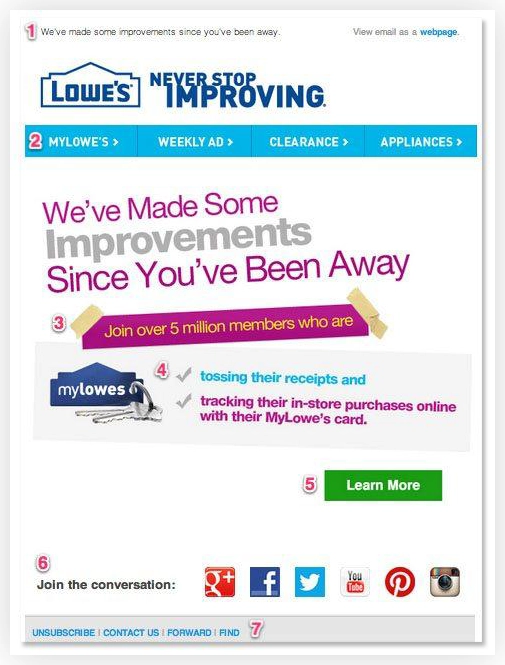
Lowe’s done a marvelous job in attracting the attention of subscribers. They use the recent improvements in their products done since the last engagement by the subscriber to pique their interest. On top of that, they share an interesting fact – that over 5 million people use their services.
This highlights the trust in their brand and pushes for more engagement. The addition of social sharing buttons in the email footer prompts engagement in different channels, too.
3. Grammarly
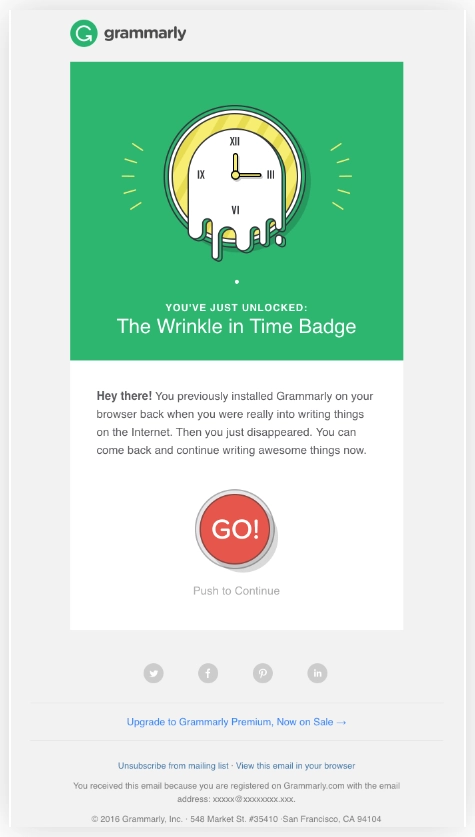
Recent data shows that, every day, there are 347.3 billion emails received in the world. Most people get hundreds of messages daily, many of which are from tools and brands they subscribed to.
So, how do you stand out in a crowd? Grammarly uses the ‘wrinkle in time’ badge in combination with a CTA ‘GO’ button that tempts the recipient to check out – and use the service once again.
4. Urban Outfitters

Talk about a modern way to engage the audience! Urban Outfitters use a unique approach toward engaging their followers. They blend emotion with humor and present the message in the form of a chat. It’s very appropriate for their brand, and it stands out well in a crowded inbox.
5. Paul Mitchell
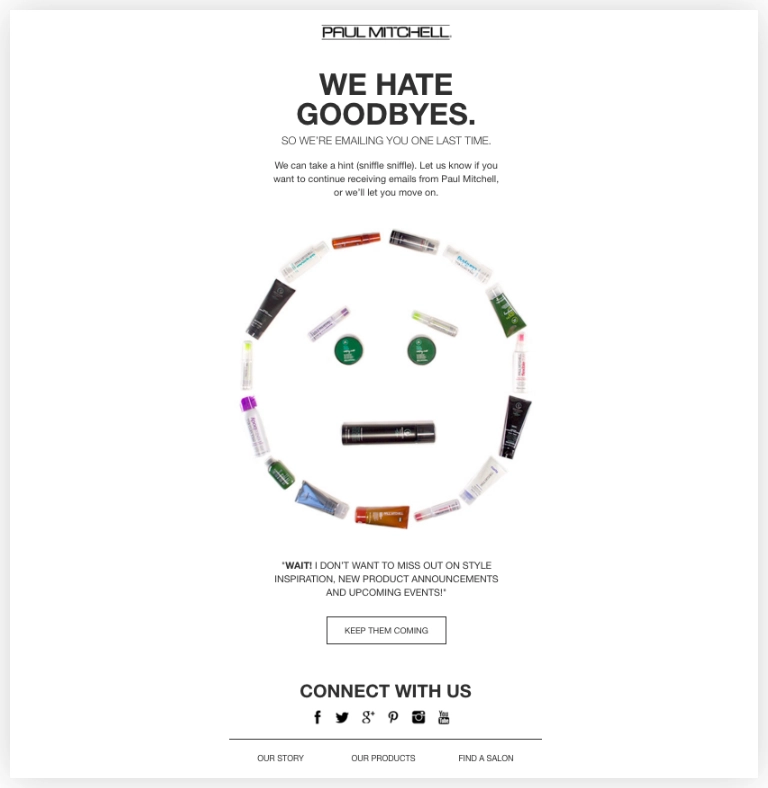
Paul Mitchel is another example of a brand with a catchy, rather silly, but very effective ‘we hate goodbyes’ email. In fact, Paul Mitchell has taken matters a bit further.
They tell the recipient that this is the last email they’ll send since they haven’t seen any activity on their behalf. If the subscriber wants to continue receiving messages, they can simply click on ‘keep them coming’.
On one hand, it gives the subscribers a soft nudge. On the other hand, it gives them a choice and shows them that the business doesn’t want to bother them. Finally, it’s a great way to create a healthier subscriber list with people who are really interested. So, bravo Paul Mitchell!
6. Duolingo
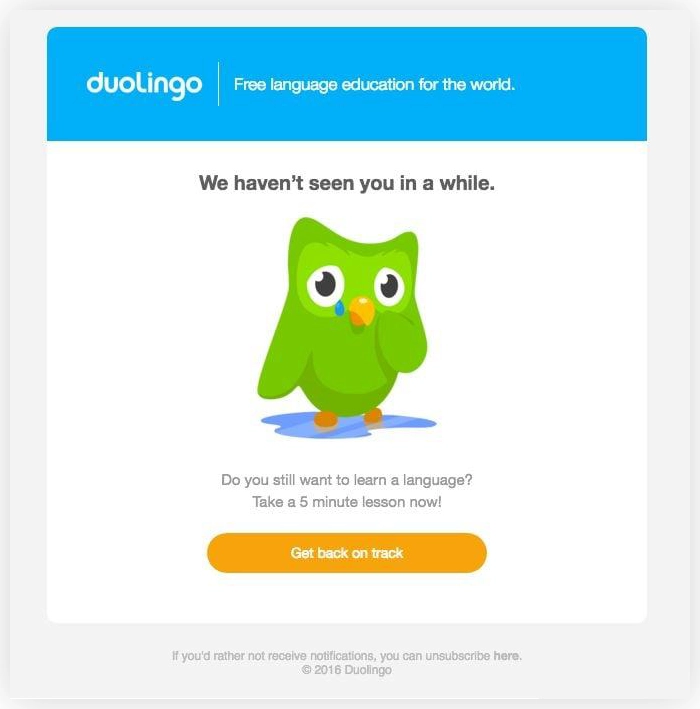
Plain and simple – Duolingo tells its subscribers that the brand misses them. It’s simple, bold, and useful. The image of their green mascot with a sad face grabs the attention and the message reminds you that it just takes 5 minutes to complete another language lesson.
7. H&M

One thing that works wonders for attracting attention is a gift. H&M has a very appealing approach – they give people 15% off their next purchase to convince them to ‘stay together’ with a business that offers many perks. At the very least, it will convince most to scour the pages to see what’s on offer!
8. Express
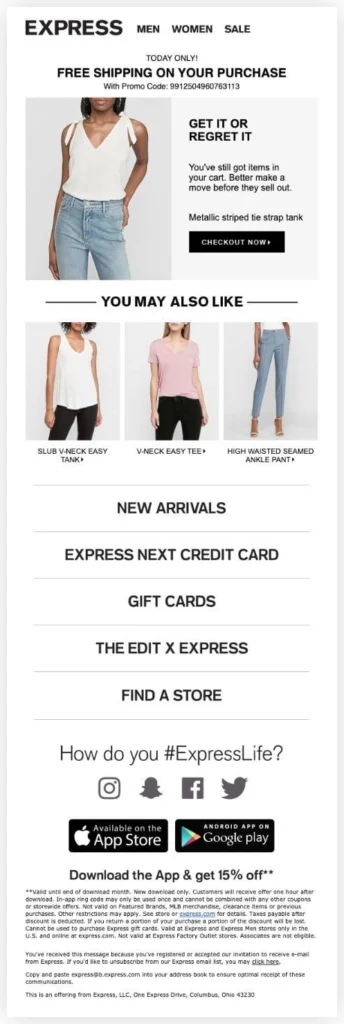
Similar to H&M, Express decided to give something free to subscribers to re-engage them. In this case, they share a promo code for free shipping on a purchase. It’s a limited-time offer, which prompts recipients to act now. Many of them will check out the items on offer and some will make a purchase to use the code.
9. Kickstarter

Kickstarter sends a message to users that haven’t been back to the website after their project was successfully funded. So, they decided to give advice on the recipient’s next move and how they can find more success in the future.
10. Path
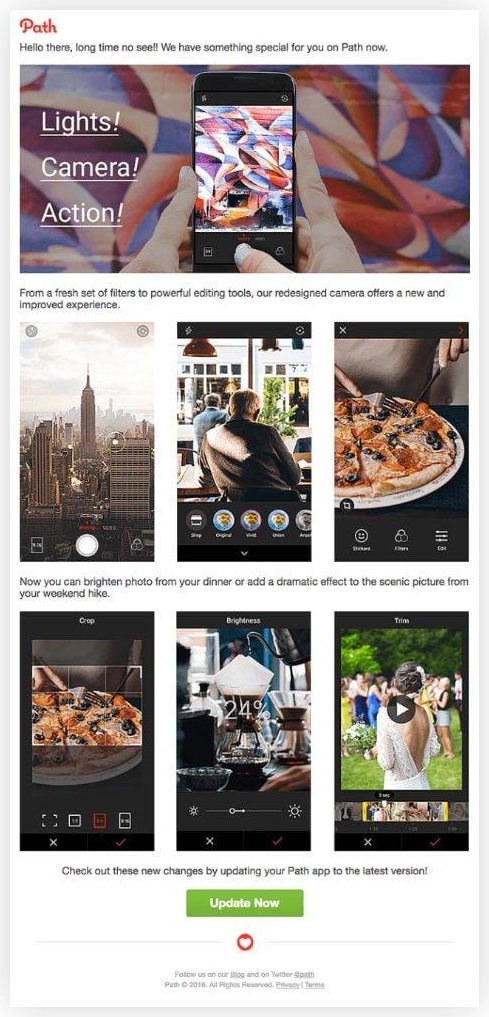
Path, a trending photo editing app nudges the inactive users by highlighting their new features. They also add some high-quality visuals to showcase the features of the app and encourage people to update it. Basically, you’d be getting proof of what you’ll see if you keep using Path.
11. Circle Furniture

Circle Furniture has a simple re-engagement message, but it’s classy and very useful. They tell recipients that they are not mad for the inactivity, and understand how busy inboxes are. Their message allows recipients to decide if they want to keep getting emails or unsubscribe.
12. Disney+

Disney is one of the most creative companies of all time, so of course their re-engagement email is great! They use the holidays as an inspiration and create a bit of nostalgia to win back their deactivated users.
This message was sent during the Christmas season, showcasing some of the best TV shows and holidays movies that people can enjoy if they reactivate the Disney subscription.
13. Hired
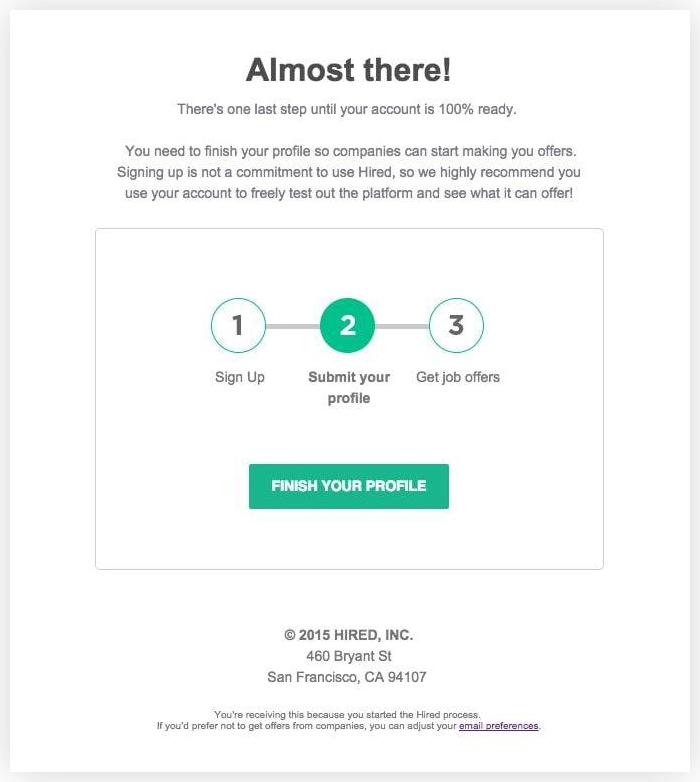
Finally, we have Hired, a company that wants to nudge the people who haven’t been active since they signed up. Many people stop halfway and never get the chance to find a great job. It’s a reminder that you just need to do a few things to find the job offers you need.
Wrapping Up
The best leads you can have as a marketer are returning leads. This is why you need to prioritize keeping people who are already interested on board. To make your re-engagement efforts more compelling, consider including an animated flipbook in your “we miss you emails to grab attention and showcase your offerings in an engaging way. Hopefully, these emails have inspired you to create your own and keep those subscribers interested!

























 Email
Email SMS
SMS Whatsapp
Whatsapp Web Push
Web Push App Push
App Push Popups
Popups Channel A/B Testing
Channel A/B Testing  Control groups Analysis
Control groups Analysis Frequency Capping
Frequency Capping Funnel Analysis
Funnel Analysis Cohort Analysis
Cohort Analysis RFM Analysis
RFM Analysis Signup Forms
Signup Forms Surveys
Surveys NPS
NPS Landing pages personalization
Landing pages personalization  Website A/B Testing
Website A/B Testing  PWA/TWA
PWA/TWA Heatmaps
Heatmaps Session Recording
Session Recording Wix
Wix Shopify
Shopify Magento
Magento Woocommerce
Woocommerce eCommerce D2C
eCommerce D2C  Mutual Funds
Mutual Funds Insurance
Insurance Lending
Lending  Recipes
Recipes  Product Updates
Product Updates App Marketplace
App Marketplace Academy
Academy

